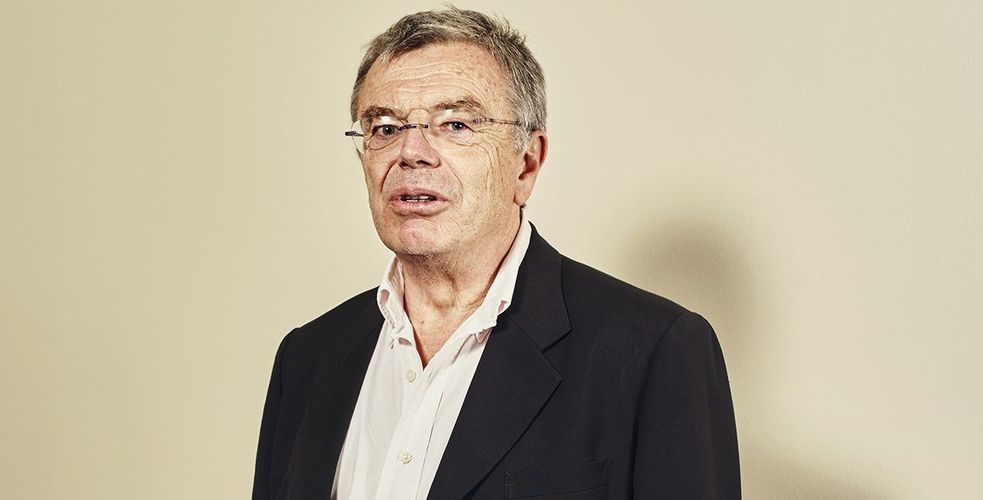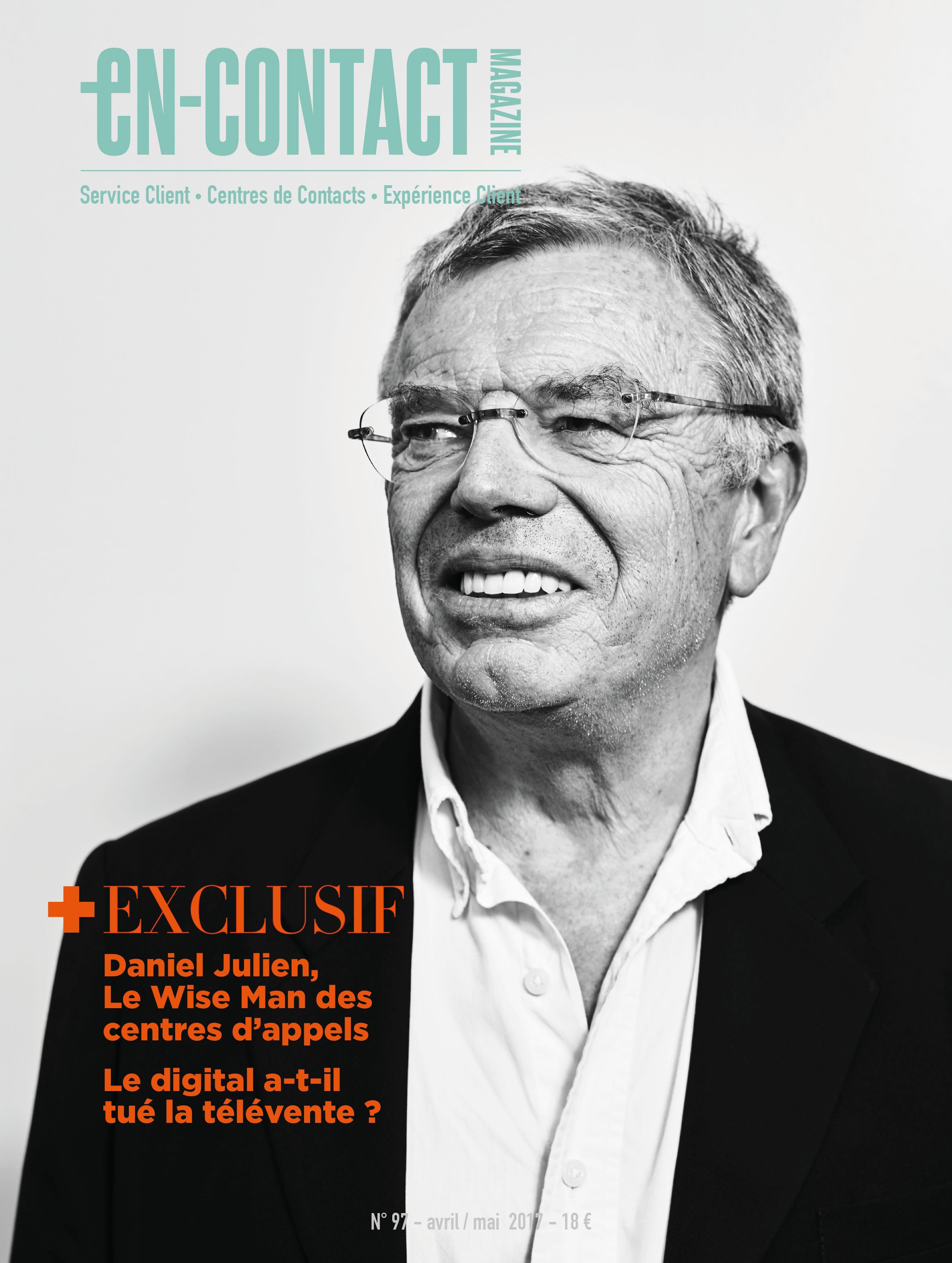Call centers are the armies of the 21st century : interview with Daniel Julien (Teleperformance)

Teleperformance will enter the CAC 40 the 22nd of June. The company, an Amazon contractor, among others, was created in France in 1978. A few weeks ago, unions related that call center workers were enduring “subhuman conditions” in Philippines.
First published in En-Contact 97, in May 2017.
Just as there’s a Warren Buffet* of investment and finance, wise and effective from the depths of Nebraska, there’s also a wise man of call centers, prudent and equally discreet: his Cherry Coke (Warren’s favourite drink apparently) is tea, which he pours from a teapot. His lair is Florida – his adopted home for the last fifteen years – and his passion is… call centers. The Berskhire Hathaway* of this sector is called Teleperformance, which is still riding high in the global rankings perhaps because the man who founded it stays “focused”, enthusiastic, pragmatic, and little inclined to talk, unless it’s about his baby.
And this is exactly what he accepted to do on 24 March, at 11am, in North Lauderdale… where he welcomed the EN-CONTACT team for an interview and a few exclusive photos.

You recently said in an interview that the company’s priority was to chase growth in Asia and China, where there’s a low customer relationship outsourcing rate. Is this where Teleperformance’s growth is going to come from?
Yes, but not exclusively. Of course, we’re guided by a geographic focus, given the growth of this region, and that applies to other businesses too: all large companies are underrepresented in these regions, and they know it. We already employ 6,000 people in China, but on behalf of clients from other countries, who want to provide and ensure a specific level of customer service to their customers in this market. But in other regions, including English-speaking countries, there’s also room for growth, for one simple reason: the more companies grow, the more they look for versatility and flexibility, which is what we provide and enable them to achieve.
In reality, the growth of our businesses is more fragile in economies where there’s an element of inflexibility, a social “Maginot line” – Italy, France and Germany.
So the future’s bright for companies in your industry?
Yes, although I’d add a reservation or exception to that, because at the same time, there’s now a barrier to entry created by the high level of performance and “objectivized expertise” expected by clients. They want global partners, whose results they regularly compare (stack ranking), and the impact of these rankings is that you might either be favoured because you’re at the top, or given a warning if the performance indicators aren’t up to scratch in terms of quality.
What these components and behaviours create in the end is a remarkable state of affairs: stable, long-term relationships, if you can deliver on quality and performance. In fact, the more big companies look for versatility, the more they need stable relationships with their service providers and partners.
Is your business compromised or under threat, as we often read in the media, by artificial intelligence and chatbots, which risk replacing call center agents?
(smile) The press and media tend to underestimate a key component of our business – that most of the customer interactions we have and manage in call centers are not purely rational: they often have an emotional dimension. There’s a permanent back-and-forth between what is requested, expressed, the rephrasing an agent might do, and the element of support people expect. Artificial intelligence provides only a partial response to that, by offering the best possible response from a purely rational point of view.
In reality, I’d even say I’m very optimistic about the future of our business, for two reasons:
• first, technology plays an increasingly important role in our lives, and people need a lot of help: the so-called services that are supposed to make our lives easier often make them more complicated. I often think of a friend who moved near my home in Miami and who wanted a connected
house. There’s always some glitch in his home when he wants to switch off a light, for example, or open the garage door. It makes me laugh sometimes because I prefer to flick the switch myself when I turn out the light.
• the second point is about consumer behaviour, because it’s impossible now for people to imagine not being able to ask everything of their suppliers and brands, and not getting an immediate response from them.
That’s why I think our business (BPO and call center services) is not under threat: I’d even say the pizza is getting bigger! Having said that, I’m not a crazy old man: we know that artificial intelligence has a role to play, and Teleperformance has formed an international R&D team, managed by an AI expert, tasked with integrating the “chatbot” into our omnichannel solution, which should be up and running before summer. You can see it for yourselves when you visit in TP France one of the fourteen demonstration laboratories that we’ve set up across the world.
Outsourcers now present themselves as customer experience specialists, that everyone’s talking about and everyone includes in their marketing promise. What are your thoughts on that?
We’re ready and able to help brands produce the “seamless experience” you mention, but very often the reality is that the main obstacle to providing it lies within the organization itself. There are lots of internal brakes in the way companies are still organized, and they don’t seem ready.

And yet they stand to gain a lot from making a move on these issues?
Yes, but there’s something almost philosophical and sociological about it. Let’s use the example of medicine, which is very technical these days, and where each specialist focuses on their own field without taking into account the big picture from a holistic point of view.
In reality, modernity creates complexity. Let’s come back to the “business line” aspect. This is why, for example, we work on tools like our internal CRM, called “TP client”: if you contact a business for the first time via social media, the next time, we need to be able to track that, and to have a record of it, using a single tool.
Telepeformance has grown by bringing together SMEs, through acquisitions. Do people and individual talents still have a decisive role to play? How do you track them down and find them?
Call centers are the armies of the 21st century, and what makes a difference is often the charisma of the general in command of this army, but it’s also important to have an in-depth knowledge of our business, and the way the machine works. A call center can’t be remotely supervised or managed. For all of these reasons, I’m an evangelist of internal promotion: the job of call center agents is exhausting and it’s not always well-paid given its intrinsic difficulties, but at least it allows you to move on in your career.
Talent spotting, knowing how the engine works, being global, are these qualities enough to be a leader or to aim for that position?
(smile) No, I don’t think so. The major strength of our company is also the process. I was just talking about the army: it needs a general, love and therefore respect, but also discipline and processes. At Teleperformance, everything that makes the machine work smoothly is recorded and written down, and I’m convinced that it’s one of our greatest strengths – an edge we still have on our competitors.
You’re French. You’re one of the inventors of this business line in which other French people are now enjoying a lot of success, and have big plans for the future: are the French good customer relationship specialists?
Yes, I was born in France and we were one of the companies that laid the foundations for success in France, but I’m Franco-American now and, above all, I manage a global company that goes beyond borders. I really do believe in the melting pot: in our company, and in all expanding companies, Indians are working alongside Brazilians, Greeks, Asians, and so on, and so much the better.
What still motivates you?
I’m interested in my work, and my responsibility, since we were floated on the stock market, is to create value.
TP’s business is to take calls for customers of all kinds of companies, and also to make calls to generate sales. I’d personally like to be called by the founder of the global leader, to get a call from Daniel Julien.
He smiled, picked up his phone, asked for my number and my phone rang. The Warren Buffet (of call centers) said to me: you need to answer now ?
Published in En-Contact number 97. three years ago.
Interview by Manuel Jacquinet
The French version here.
Discover the Citizen Kane et les Beautiful People.

En-Contact cover N°97
*Warren Buffet: an American businessman and investor, and one of the richest men in the world since the start of the 21st century.
*Berkshire Hathaway: an American multinational conglomerate holding company headquartered in Omaha, Nebraska. The company is managed by Warren Buffet.







